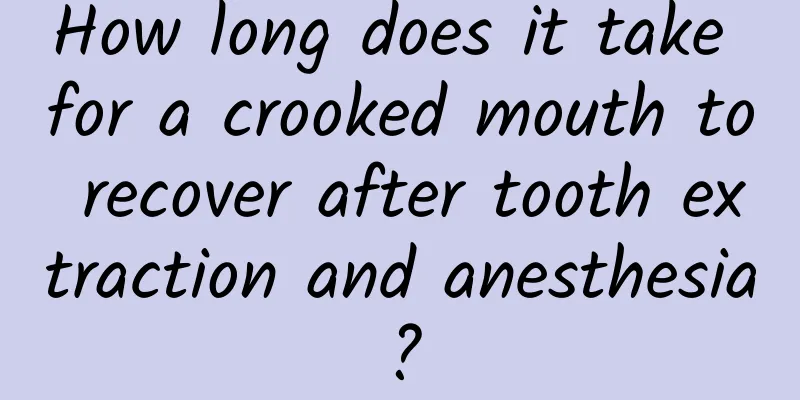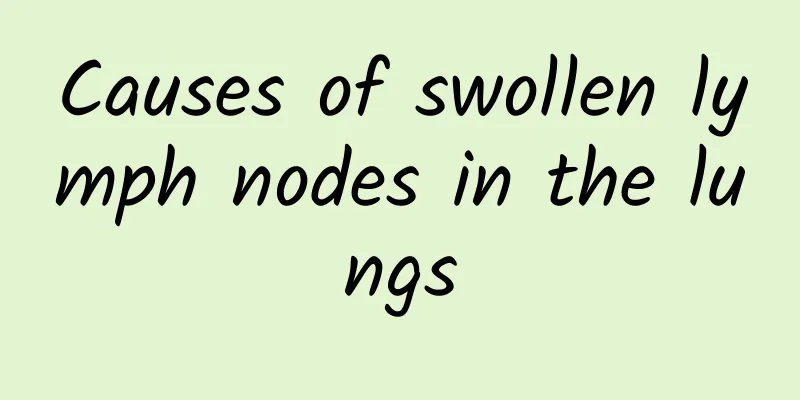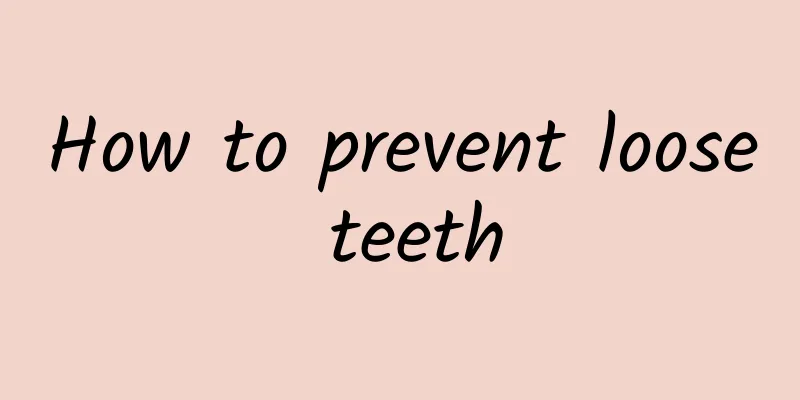How long does it take for a crooked mouth to recover after tooth extraction and anesthesia?

|
Anesthesia is required when extracting teeth. For a small number of patients, anesthesia may have certain effects, such as causing the mouth to become crooked. After the anesthetic wears off, you will be able to recover on your own, and you will be able to recover relatively well in three to five hours. Of course, you should also check in time to see if the nerves are damaged. Once the nerves are damaged, it will be quite troublesome. Things to note after tooth extraction: 1. The gauze or cotton ball on the wound after tooth extraction needs to be bitten for about half an hour and then spit out. When biting the gauze, if there is saliva, please swallow it normally. Do not keep it in your mouth for a long time, which will give you the illusion that there is a lot of bleeding. A small amount of blood in your saliva is normal for 48 hours. Don't be alarmed if your saliva is slightly bloody, but if the blood continues to appear, contact your doctor. 2. After tooth extraction, you can rest in a semi-recumbent position, but do not lie flat on your back. Do not take a hot bath immediately to avoid bleeding from the wound. 3. You can drink water and eat 2 hours after tooth extraction. You can eat liquid or semi-liquid food, but avoid eating hard or overheated food. It must be noted that soft food should be eaten after 2 hours; food should not be overheated, and chewing with the side where the tooth was extracted should be avoided. Otherwise, if you do not pay attention to the above points before the blood clot is completely organized, it may cause the blood clot to be destroyed and cause bleeding. 4. Do not engage in strenuous exercise or heavy physical labor, drink alcohol, play musical instruments, suck on the wound, or rinse your mouth on the day of tooth extraction. 5. After the anesthetic wears off, there will be a slight pain in the tooth extraction wound, but generally no medication is needed. If there is fever, severe pain, swelling or heavy bleeding, you should seek medical attention immediately. What symptoms occur after tooth extraction? The most common complications after tooth extraction are collapse or fainting, allergy to anesthetics, bleeding and infection, and dry socket. First of all, bleeding will definitely occur after tooth extraction. You will be asked to bite the gauze for half an hour or the wound will be larger to help you sew stitches to reduce bleeding. You can rest assured that if you do not have any blood problems or have not taken anticoagulant drugs for a long time, the bleeding will generally stop in half an hour. Also, if you are a girl, do not have a tooth extracted during menstruation. After the tooth extraction, the doctor will generally tell you the precautions after the extraction: bite the gauze for half an hour, you can eat after 2 hours, eat cool and soft food on the same day, it is best not to eat with the side where the tooth was extracted, you cannot brush your teeth or rinse your mouth for 24 hours, it is normal to have blood two days after the extraction, if it is more difficult to extract, such as impacted wisdom teeth, there may be swelling, which can be relieved by applying cold compress within 24 hours after the extraction, and hot compress should be applied after 24 hours. |
<<: What are the side effects of giving birth with anesthesia?
>>: How long after anesthesia can I breastfeed?
Recommend
What are the effects and functions of fried Alisma orientalis with bran?
In our lives, many Chinese medicinal materials ar...
What causes teeth grinding while sleeping?
Bruxism refers to the habit of grinding teeth dur...
What is the correct sleeping position during late pregnancy? What is the role of correct sleeping posture?
After pregnancy, every word and action of the pre...
How to treat thick white tongue coating, diet and daily conditioning methods
I don’t know if you have ever observed your tongu...
How is Streptococcus agalactiae infected?
The human body itself is accompanied by a lot of ...
The role of the placenta, commonly used Chinese medicine
Many women will keep their placenta after giving ...
What causes flat warts?
Flat warts are a skin disease caused by a viral i...
What are the symptoms of mastitis edema?
Mastitis is accompanied by edema, which can cause...
How to cook Hedyotis diffusa
Snake tongue grass is a kind of Chinese herbal me...
How to cure tinea corporis to eradicate it, and the prognosis of treatment should be good
The treatment of tinea corporis is still mainly b...
Fallopian tube recanalization
When women want to get pregnant, they need to hav...
What does internal injury and dampness stagnation mean?
I believe that many people do not know enough abo...
How to remove the needle during infusion
Almost everyone has been to the hospital for an I...
Why does my chin lymph node hurt when I press it?
It is also common to have swollen lymph nodes in ...
Focal low-grade squamous intraepithelial lesion
Most women are affected by gynecological diseases...









